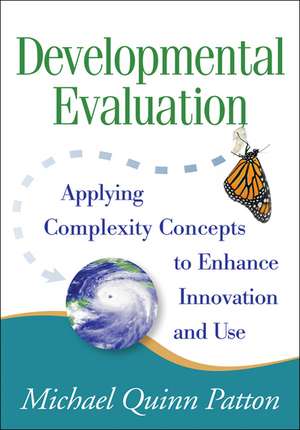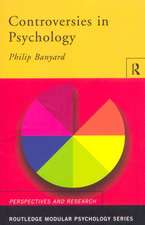Developmental Evaluation: Applying Complexity Concepts to Enhance Innovation and Use
Autor Michael Quinn Pattonen Limba Engleză Paperback – 13 aug 2010
Developmental evaluation (DE) offers a powerful approach to monitoring and supporting social innovations by working in partnership with program decision makers. In this book, eminent authority Michael Quinn Patton shows how to conduct evaluations within a DE framework. Patton draws on insights about complex dynamic systems, uncertainty, nonlinearity, and emergence. He illustrates how DE can be used for a range of purposes: ongoing program development, adapting effective principles of practice to local contexts, generating innovations and taking them to scale, and facilitating rapid response in crisis situations. Students and practicing evaluators will appreciate the book's extensive case examples and stories, cartoons, clear writing style, "closer look" sidebars, and summary tables. Provided is essential guidance for making evaluations useful, practical, and credible in support of social change.
See also Developmental Evaluation Exemplars, edited by Michael Quinn Patton, Kate McKegg, and Nan Wehipeihana, which presents 12 in-depth case studies.
See also Developmental Evaluation Exemplars, edited by Michael Quinn Patton, Kate McKegg, and Nan Wehipeihana, which presents 12 in-depth case studies.
Preț: 396.72 lei
Nou
Puncte Express: 595
Preț estimativ în valută:
75.91€ • 81.18$ • 63.29£
75.91€ • 81.18$ • 63.29£
Carte disponibilă
Livrare economică 28 martie-11 aprilie
Livrare express 13-19 martie pentru 41.38 lei
Preluare comenzi: 021 569.72.76
Specificații
ISBN-13: 9781606238721
ISBN-10: 1606238728
Pagini: 375
Ilustrații: black & white illustrations, black & white tables
Dimensiuni: 178 x 254 x 20 mm
Greutate: 0.68 kg
Ediția:1
Editura: Guilford Publications
Colecția Guilford Press
ISBN-10: 1606238728
Pagini: 375
Ilustrații: black & white illustrations, black & white tables
Dimensiuni: 178 x 254 x 20 mm
Greutate: 0.68 kg
Ediția:1
Editura: Guilford Publications
Colecția Guilford Press
Public țintă
Professional Practice & DevelopmentCuprins
1. Developmental Evaluation Defined and Positioned
*The Distinction Emerges
*Facing Complexity and Facing Reality: Or, Facing the Realities of Complexity
*Developmental Evaluation and Complexity Theory
*Developmental Evaluation and Single-Loop versus Double-Loop Learning
*The Importance of Interpretive Frameworks
*Developmental Evaluation as Utilization-Focused
*Charting the Developmental Journey: Overview of the Book
*Five Developmental Evaluation Purposes and Uses
2. Developmental Evaluation as a Distinct Purpose and Niche
*Beyond Planning: Jumping into the Fire
*Evaluation Questions under These Different Engagement Scenarios
*Vision Encounters Reality: The Territory of Developmental Evaluation
*Systems Issues: Boundary Management as a Developmental Evaluation Focus
*Developing Innovations versus Improving and Testing Models: Developmental Evaluation Distinguished from Formative and Summative Evaluation
*Ongoing Development Informed by Developmental Evaluation
*Strategic Thinking and Developmental Evaluation
*The Niche of Developmental Evaluation: Chapter Overview and Summary
3. Thinking Outside Evaluation’s Boxes
*Creative Evaluation
*Of Plums and Prunes
*History and Biography as Context: The Personal Factor
*More History and Biography as Context
*Fundamental Principles
*Developmental Evaluation in Context
*External Evaluators and Developmental Evaluation
*Ten Key Points about Developmental Evaluation Illustrated by the Caribbean Example
4. Situation Recognition and Responsiveness: Distinguishing Simple, Complicated, and Complex
*Detecting Patterns
*Detecting Complexity as a Distinct Pattern and Territory for Inquiry
*The Challenges of Situation Recognition
*A Situation Recognition Heuristic: Distinguishing Simple, Complicated, and Complex
*Situational Evaluation: Implications for Practice
*Variations on a Theme: The Cynefin Framework
5. Systems Thinking and Complexity Concepts for Developmental Evaluation
*From Train Brakeman to Locomotive Engineer to Evaluation Champion
*Project SleepBetter
*Systems Thinking
*Complexities of Complexity
*Useful Complexity Constructs for Developmental Evaluation
*Complexity-Sensitizing Concepts
6. How the World Is Changed: A Dialectic with Thesis and Antithesis and Developmental Evaluation as the Synthesis
*Competing Perspectives on How the World Is Changed
*The Top-Down Approach
*Adaptation versus Replication: Principles for Developmental Evaluation
*Best Practices versus Effective Principles
*From the Grass Roots to the Adaptive Middle
*Alternative Approaches to Change
*Developmental Evaluation: The Action in the Muddled Middle
*Looking Back and Looking Forward
*Appendix 6.1. Positioning and Contrasting Developmental Evaluation with Other Evaluation Approaches
7. The Adaptive Cycle and Developmental Evaluation
*Some Context for Understanding the Adaptive Cycle: Poetry, Ecology, Sociology, Business, and Evaluation
*The Complexity Doorframe Redux
*Five Developmental Evaluation Purposes and Uses
*Resilience and Developmental Evaluation
*A Strategic Approach to Resilience: Engineering Resilience versus Ecosystem Resilience
*The Adaptive Cycle
*The Adaptive Cycle and Psychosocial Regimes
*Evaluation and the Adaptive Cycle
*Through the Looking Glass of the Adaptive Cycle: Examples of Organizational and Program Cycles
*Transitions and Traps
*Taking an Innovation to Scale: Challenges and Traps in Cross-Scale Change
*Panarchy: Cross-Scale Interactions
*Panarchy-Informed Evaluation: The Fact of a Doorframe
8. Developmental Evaluation Inquiry Frameworks
*Frameworks for Developmental Evaluation Inquiry
*Developmental Evaluation Inquiry Frameworks: Ten and Counting . . .
9. Developmental Evaluation Bricolage: Reflective Practice, Sensitizing Concepts, Action Research, Abduction, Systems Change, and Retrospective Developmental Evaluation
*Reflective Practice for Developmental Evaluation Inquiry and Engagement
*Sensitizing Concepts as a Focus for Reflective Practice and Developmental Evaluation
*Kia ora
*Action Research and Developmental Evaluation
*Intersections of Developmental Evaluation and Action Research: A Distinguished Evaluation Pioneer Reflects
*Reasoning and Developmental Evaluation
*In Praise of Methodological Diversity and Appropriateness: A Methods and Tools Rant
*Systems Change and Developmental Evaluation
*Retrospective Developmental Evaluation
*Damiano’s Retrospective Developmental Evaluation
*Developmental Evaluation Bricolage
10. Utilization-Focused Developmental Evaluation: Engagement Practices, Diverse Designs, and Adaptive Methods
*Different Kinds of Developmental Evaluation
*Diversity of Design and Methods Options
*Utilization-Focused Developmental Evaluation
*Ten Utilization-Focused Developmental Evaluation Design Examples
*Developmental Evaluation Engagement, Design, and Methods Summary
*The First Developmental Evaluation: A Creation Story
*The Distinction Emerges
*Facing Complexity and Facing Reality: Or, Facing the Realities of Complexity
*Developmental Evaluation and Complexity Theory
*Developmental Evaluation and Single-Loop versus Double-Loop Learning
*The Importance of Interpretive Frameworks
*Developmental Evaluation as Utilization-Focused
*Charting the Developmental Journey: Overview of the Book
*Five Developmental Evaluation Purposes and Uses
2. Developmental Evaluation as a Distinct Purpose and Niche
*Beyond Planning: Jumping into the Fire
*Evaluation Questions under These Different Engagement Scenarios
*Vision Encounters Reality: The Territory of Developmental Evaluation
*Systems Issues: Boundary Management as a Developmental Evaluation Focus
*Developing Innovations versus Improving and Testing Models: Developmental Evaluation Distinguished from Formative and Summative Evaluation
*Ongoing Development Informed by Developmental Evaluation
*Strategic Thinking and Developmental Evaluation
*The Niche of Developmental Evaluation: Chapter Overview and Summary
3. Thinking Outside Evaluation’s Boxes
*Creative Evaluation
*Of Plums and Prunes
*History and Biography as Context: The Personal Factor
*More History and Biography as Context
*Fundamental Principles
*Developmental Evaluation in Context
*External Evaluators and Developmental Evaluation
*Ten Key Points about Developmental Evaluation Illustrated by the Caribbean Example
4. Situation Recognition and Responsiveness: Distinguishing Simple, Complicated, and Complex
*Detecting Patterns
*Detecting Complexity as a Distinct Pattern and Territory for Inquiry
*The Challenges of Situation Recognition
*A Situation Recognition Heuristic: Distinguishing Simple, Complicated, and Complex
*Situational Evaluation: Implications for Practice
*Variations on a Theme: The Cynefin Framework
5. Systems Thinking and Complexity Concepts for Developmental Evaluation
*From Train Brakeman to Locomotive Engineer to Evaluation Champion
*Project SleepBetter
*Systems Thinking
*Complexities of Complexity
*Useful Complexity Constructs for Developmental Evaluation
*Complexity-Sensitizing Concepts
6. How the World Is Changed: A Dialectic with Thesis and Antithesis and Developmental Evaluation as the Synthesis
*Competing Perspectives on How the World Is Changed
*The Top-Down Approach
*Adaptation versus Replication: Principles for Developmental Evaluation
*Best Practices versus Effective Principles
*From the Grass Roots to the Adaptive Middle
*Alternative Approaches to Change
*Developmental Evaluation: The Action in the Muddled Middle
*Looking Back and Looking Forward
*Appendix 6.1. Positioning and Contrasting Developmental Evaluation with Other Evaluation Approaches
7. The Adaptive Cycle and Developmental Evaluation
*Some Context for Understanding the Adaptive Cycle: Poetry, Ecology, Sociology, Business, and Evaluation
*The Complexity Doorframe Redux
*Five Developmental Evaluation Purposes and Uses
*Resilience and Developmental Evaluation
*A Strategic Approach to Resilience: Engineering Resilience versus Ecosystem Resilience
*The Adaptive Cycle
*The Adaptive Cycle and Psychosocial Regimes
*Evaluation and the Adaptive Cycle
*Through the Looking Glass of the Adaptive Cycle: Examples of Organizational and Program Cycles
*Transitions and Traps
*Taking an Innovation to Scale: Challenges and Traps in Cross-Scale Change
*Panarchy: Cross-Scale Interactions
*Panarchy-Informed Evaluation: The Fact of a Doorframe
8. Developmental Evaluation Inquiry Frameworks
*Frameworks for Developmental Evaluation Inquiry
*Developmental Evaluation Inquiry Frameworks: Ten and Counting . . .
9. Developmental Evaluation Bricolage: Reflective Practice, Sensitizing Concepts, Action Research, Abduction, Systems Change, and Retrospective Developmental Evaluation
*Reflective Practice for Developmental Evaluation Inquiry and Engagement
*Sensitizing Concepts as a Focus for Reflective Practice and Developmental Evaluation
*Kia ora
*Action Research and Developmental Evaluation
*Intersections of Developmental Evaluation and Action Research: A Distinguished Evaluation Pioneer Reflects
*Reasoning and Developmental Evaluation
*In Praise of Methodological Diversity and Appropriateness: A Methods and Tools Rant
*Systems Change and Developmental Evaluation
*Retrospective Developmental Evaluation
*Damiano’s Retrospective Developmental Evaluation
*Developmental Evaluation Bricolage
10. Utilization-Focused Developmental Evaluation: Engagement Practices, Diverse Designs, and Adaptive Methods
*Different Kinds of Developmental Evaluation
*Diversity of Design and Methods Options
*Utilization-Focused Developmental Evaluation
*Ten Utilization-Focused Developmental Evaluation Design Examples
*Developmental Evaluation Engagement, Design, and Methods Summary
*The First Developmental Evaluation: A Creation Story
Recenzii
Proust wrote that 'the real voyage of discovery consists not in seeking new landscapes but in having new eyes.' In this book, Patton brings new eyes to evaluation landscapes. He illustrates the distinct contribution that developmental evaluation can make in addressing the dynamic complexity that often challenges evaluation efforts. Evaluators will see themselves among the stories Patton shares. The concepts and ideas are accessible and the case examples provide a diverse array of teachable vignettes, making the book ideal for classroom use. This is a most enjoyable read that offers lots of new learning, even for an evaluation veteran!--Ann M. Doucette, PhD, Director, The Evaluators’ Institute, The George Washington University
There is a real hunger for this book among social innovators, funders, policymakers, and educators. The book is sure to become dog-eared as it is read, used, and reread to help evaluators conduct their work in a manner consistent with the complexity of the challenges they are addressing.--Brenda Zimmerman, PhD, Director, Health Industry Management Program, Schulich School of Business, York University, Canada
In true Michael Quinn Patton style, this book successfully extends both the theory and practice of evaluation in significant and timely ways. Solutions to the world’s most pressing social problems are neither predictable nor known; developmental evaluation is just what the field needs to evaluate the complex realities of today’s organizations and communities. This book is a 'must read' for anyone committed to understanding how, where, when, and for whom social innovations are achieving their goals.--Hallie Preskill, PhD, Executive Director, Strategic Learning and Evaluation Center, FSG Social Impact Advisors, Seattle, Washington
There is a real hunger for this book among social innovators, funders, policymakers, and educators. The book is sure to become dog-eared as it is read, used, and reread to help evaluators conduct their work in a manner consistent with the complexity of the challenges they are addressing.--Brenda Zimmerman, PhD, Director, Health Industry Management Program, Schulich School of Business, York University, Canada
In true Michael Quinn Patton style, this book successfully extends both the theory and practice of evaluation in significant and timely ways. Solutions to the world’s most pressing social problems are neither predictable nor known; developmental evaluation is just what the field needs to evaluate the complex realities of today’s organizations and communities. This book is a 'must read' for anyone committed to understanding how, where, when, and for whom social innovations are achieving their goals.--Hallie Preskill, PhD, Executive Director, Strategic Learning and Evaluation Center, FSG Social Impact Advisors, Seattle, Washington
Patton pulls back the curtain to reveal that there is no great Oz of evaluation. This book reminds us that when we are working in complex systems we are better off acknowledging how little we know from the outset--and then acting on continual feedback--rather than pretending we already have all the knowledge needed to succeed. Patton challenges evaluators to relentlessly adapt, react, change, and innovate to work toward the best outcomes.--John B. Bare, PhD, Vice President, The Arthur M. Blank Family Foundation, Atlanta, Georgia
Notă biografică
Michael Quinn Patton, PhD, is an independent consultant who has been conducting program evaluations since the 1970s. Based in Minnesota, he was on the faculty of the University of Minnesota for 18 years and is a former president of the American Evaluation Association (AEA). His books include Blue Marble Evaluation, Developmental Evaluation, Developmental Evaluation Exemplars, Principles-Focused Evaluation, Qualitative Research and Evaluation Methods (now in its fourth edition), and Utilization-Focused Evaluation (now in its fourth edition), among others. He is a recipient of the Alva and Gunnar Myrdal Evaluation Practice Award and the Paul F. Lazarsfeld Evaluation Theory Award, both from AEA, as well as the Lester F. Ward Distinguished Contribution to Applied and Clinical Sociology Award from the Association for Applied and Clinical Sociology. Dr. Patton is an active trainer and workshop presenter who has conducted applied research and evaluation on a broad range of issues and has worked with organizations and programs at the international, national, state, provincial, and local levels.
Descriere
Developmental evaluation (DE) offers a powerful approach to monitoring and supporting social innovations by working in partnership with program decision makers. In this book, eminent authority Michael Quinn Patton shows how to conduct evaluations within a DE framework. Patton draws on insights about complex dynamic systems, uncertainty, nonlinearity, and emergence. He illustrates how DE can be used for a range of purposes: ongoing program development, adapting effective principles of practice to local contexts, generating innovations and taking them to scale, and facilitating rapid response in crisis situations. Students and practicing evaluators will appreciate the book&










